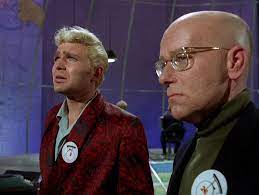
Number Six (Patrick McGoohan) is awakened one morning by a young woman, Number Fifty (Annette André), who asks him to help her stop an assassination. He does not believe her. Number Two (Derren Nesbitt) is watching the scene. Later, Number Six meets another prisoner who tells him about jammers. They concoct false assassination plots so Control will waste its time investigating them. Control has a list, of course, and ignores their warnings.
The next morning, Number Two meets with Number Eight, the Computer Attendant (Wanda Ventham) and Number 100 (Mark Eden) to discuss the computer’s schedule of Number Six’s daily routine. Everything is going to plan and Number Six will be attending his weekly Kosho workout. Number 100 is sent to the gym and replaces Number Six’s watch with a broken replica. Number Six takes his watch to the Watchmaker, Number 54 (Martin Miller).
While the Watchmaker is in the back room, Six notices a radio-operated detonation device. As Number Six leaves the shop, he runs into Number Fifty again and learns that she is the Watchmaker’s Daughter. He realizes that the Watchmaker intends to assassinate Number Two. But Number 100 assures Number Two that the Watchmaker is too thoroughly indoctrinated to consider such a thing.
Number Six, however, believes the story and is sure the entire Village will be punished if it happens. He goes to Number Two to warn him. Two, who is filming the meeting, tells Six that the Watchmaker is just a jammer and harmless. He suggests that Six find out how the assassination is supposed to happen, as he could use a good laugh. That evening, Number Six and Number Fifty return to the Watchmaker’s shop, where the Watchmaker is making a replica of the Great Seal of Office. This could be filled with explosives and detonated during the upcoming Appreciation Day Ceremony.
Number Six goes to Number Two’s house the next day and finds a different Number Two. This is an older man (André van Gyseghem) and it seems that the other Number Twos were all temporary substitutes while he was otherwise occupied. He is about to retire and is not worried about the plot. He shows film of Number Six warning all the previous Number Twos of the danger. Six insists these are fake and the plot has been hatched by the current, younger, Number Two. The older Number Two begins to believe the story. We see the younger Number Two inform Number One that the plan is working and they will not need to pay the retiring Number Two his pension.
On Appreciation Day, the Watchmaker hides in the tower, ready to detonate the bomb as the Seal of Office is placed around retiring Number Two’s neck. Number Six and Number Fifty race to the tower to stop it and Number Six gets his hands on the detonator. Number Six gives the detonator to the nervous retiring Number Two and says it is proof of the conspiracy and his passport out of the Village, and Number Two leaves in the helicopter. Later, Six meets the new Number Two and warns him that something similar might happen to him when he retires.
The episode was written by Michael Cramoy and directed by Robert Asher. The story goes that McGoohan had a nervous breakdown during its filming and got into a shouting match with the director. Actor Mark Eden accused McGoohan of nearly strangling him during the fight scene. Nesbitt, who played the younger Number Two, was told nothing about the series and played the entire episode in a state of confusion. However, I found him an attractive villain—oily and charming--so he seems to have coped quite well. Though one wonders why he stood so close to the guy with the bomb on his body.
Number Fifty is addressed by her watchmaker father as Monique. Kosho is a fictional martial art created for the series involving trampolines. There is a real Kosho Shorei Ryu Kempo martial art which is nothing like it. Kosho was rather silly, I thought, and I could have done without it. The Village, it appears, is not really in the grip of an implacable iron hand after all. There seem to be complications and flaws in its organization that Number Six could use for his own purposes. Or it could be that the flaws are in the scriptwriting, which is not unknown in episodic television. Considering all the Sturm und Drang surrounding this episode, I’m inclined to believe the latter.
